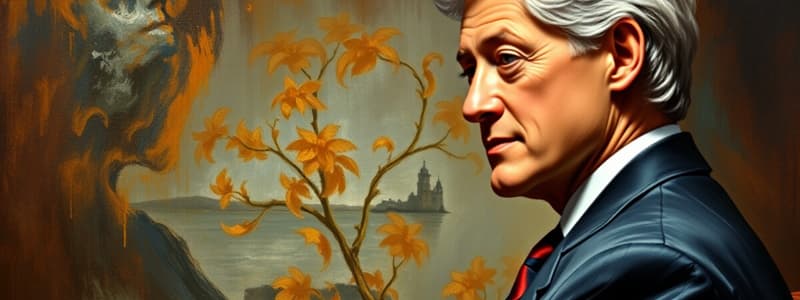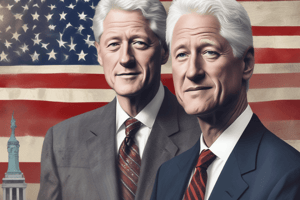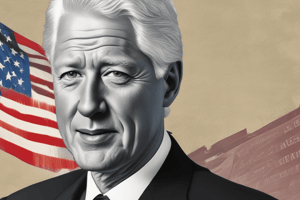Podcast
Questions and Answers
What sentiment does the storytelling trope about high school seniors imply?
What sentiment does the storytelling trope about high school seniors imply?
- They acknowledge a significant change is coming. (correct)
- They believe their friendships will remain unchanged.
- They eagerly await the future.
- They feel anxious about graduation.
What was one of the key technological advancements mentioned in Bill Clinton's inaugural address?
What was one of the key technological advancements mentioned in Bill Clinton's inaugural address?
- The development of e-commerce.
- The invention of smartphones.
- The rise of social media platforms.
- The Internet becoming accessible for everyday use. (correct)
How did Bill Clinton characterize the political landscape of the world during his second inaugural address?
How did Bill Clinton characterize the political landscape of the world during his second inaugural address?
- More people lived under democracy than dictatorship for the first time. (correct)
- It was dominated by dictatorships.
- It was marked by economic stability.
- It was divided into multiple warring factions.
What did Clinton suggest would become 'every citizen's most prized possession'?
What did Clinton suggest would become 'every citizen's most prized possession'?
What was the associated perspective regarding human health in Clinton's address?
What was the associated perspective regarding human health in Clinton's address?
In his speech, how did Clinton describe the educational aspirations for American schools?
In his speech, how did Clinton describe the educational aspirations for American schools?
Which principle reflects the essence of the American dream as envisioned by Clinton in his address?
Which principle reflects the essence of the American dream as envisioned by Clinton in his address?
What overall feeling did Clinton wish to convey about the upcoming century?
What overall feeling did Clinton wish to convey about the upcoming century?
What is the primary message emphasized regarding the impact of the Information Age?
What is the primary message emphasized regarding the impact of the Information Age?
What is Francis Fukuyama's main argument in 'The End of History and the Last Man'?
What is Francis Fukuyama's main argument in 'The End of History and the Last Man'?
According to Fukuyama, what is a key component of a liberal democratic state?
According to Fukuyama, what is a key component of a liberal democratic state?
What does Fukuyama believe about the role of authority in a state?
What does Fukuyama believe about the role of authority in a state?
Which of the following statements best reflects the content's view on family interactions in the Information Age?
Which of the following statements best reflects the content's view on family interactions in the Information Age?
How is ethnic and socioeconomic inclusion portrayed in the content?
How is ethnic and socioeconomic inclusion portrayed in the content?
What critique could be made of Fukuyama's theory as indicated in the content?
What critique could be made of Fukuyama's theory as indicated in the content?
What historical context is Fukuyama's argument placed within?
What historical context is Fukuyama's argument placed within?
What message did Bill Clinton aim to convey in his second inaugural address?
What message did Bill Clinton aim to convey in his second inaugural address?
What notable shift regarding the Internet did Clinton highlight in his address?
What notable shift regarding the Internet did Clinton highlight in his address?
Which aspect of education did Clinton emphasize would be crucial in the new era?
Which aspect of education did Clinton emphasize would be crucial in the new era?
How did Clinton describe the global political landscape in his address?
How did Clinton describe the global political landscape in his address?
Which advancement in science did Clinton mention as being on the horizon?
Which advancement in science did Clinton mention as being on the horizon?
What did Clinton say would ignite the spark of possibility in children?
What did Clinton say would ignite the spark of possibility in children?
In what way did Clinton view the transition into the 21st century?
In what way did Clinton view the transition into the 21st century?
What future educational vision did Clinton present?
What future educational vision did Clinton present?
What does Fukuyama argue is revealed through the unfolding of history?
What does Fukuyama argue is revealed through the unfolding of history?
Which of the following is NOT a requirement of a liberal democratic state according to Fukuyama?
Which of the following is NOT a requirement of a liberal democratic state according to Fukuyama?
What message does the content suggest resonates consistently across different times?
What message does the content suggest resonates consistently across different times?
What criticism is implied about Fukuyama's idea of 'the End of History'?
What criticism is implied about Fukuyama's idea of 'the End of History'?
How is the relationship between parents and children characterized in the Information Age?
How is the relationship between parents and children characterized in the Information Age?
What does the term 'modernization' refer to in Fukuyama's argument?
What does the term 'modernization' refer to in Fukuyama's argument?
What overarching theme is suggested through the reflections on music from the 90s?
What overarching theme is suggested through the reflections on music from the 90s?
According to the content, how must a state behave concerning its laws?
According to the content, how must a state behave concerning its laws?
What does Fukuyama suggest is the ideal political organization revealed through history?
What does Fukuyama suggest is the ideal political organization revealed through history?
Which of the following is NOT a requirement of a liberal democratic state according to Fukuyama?
Which of the following is NOT a requirement of a liberal democratic state according to Fukuyama?
How does the message from the content regarding education and family engagement characterize the Information Age?
How does the message from the content regarding education and family engagement characterize the Information Age?
What is a critical aspect of Fukuyama's argument concerning the evolution of history?
What is a critical aspect of Fukuyama's argument concerning the evolution of history?
In what way does the content imply that the messages about unity and economy are perceived over time?
In what way does the content imply that the messages about unity and economy are perceived over time?
What can be inferred about the portrayal of music from the 90s in relation to global transitions?
What can be inferred about the portrayal of music from the 90s in relation to global transitions?
What aspect of state authority does Fukuyama contend is essential for a liberal democracy?
What aspect of state authority does Fukuyama contend is essential for a liberal democracy?
What does the phrase 'the End of History' imply within Fukuyama's framework?
What does the phrase 'the End of History' imply within Fukuyama's framework?
What role did Bill Clinton attribute to education in the new era he envisioned?
What role did Bill Clinton attribute to education in the new era he envisioned?
How did Clinton's address reflect the technological advancements of the 1990s?
How did Clinton's address reflect the technological advancements of the 1990s?
What view did Clinton express about the global political landscape during his address?
What view did Clinton express about the global political landscape during his address?
What vision for the future did Clinton convey regarding human health advancements?
What vision for the future did Clinton convey regarding human health advancements?
In what way did Clinton's address inspire hope for the future?
In what way did Clinton's address inspire hope for the future?
Which statement aligns with Clinton's recollection of the Internet in the 1990s?
Which statement aligns with Clinton's recollection of the Internet in the 1990s?
What underlying theme regarding democracy was present in Clinton's speech?
What underlying theme regarding democracy was present in Clinton's speech?
What was a prevalent sentiment regarding the American dream in Clinton's address?
What was a prevalent sentiment regarding the American dream in Clinton's address?
Flashcards are hidden until you start studying
Study Notes
High School Seniors and Change
- High school seniors often feel that life will change significantly after graduation, reflecting a common storytelling trope.
Bill Clinton's Inaugural Address
- Delivered on January 20, 1997, as the last inaugural address of the 20th century.
- Clinton aimed to inspire hope about the emerging American dream in the 21st century.
- Notably highlighted the rapid integration of the Internet into daily life from a “mystical” tool for physicists to a resource for schoolchildren.
- Emphasized scientific advances and the potential for cures to major illnesses.
Key Themes in Clinton's Speech
- Education: Promised that it would become the most valued asset for citizens, with high standards in schools and open access to higher education.
- Family Values: Stressed the importance of time for parents and children to bond through reading and playing.
- Vision of Unity: Advocated for unity against division, global leadership, and inclusivity, presenting a message that remains relevant today.
Francis Fukuyama's "End of History"
- Fukuyama proposed that history represents the evolution of political organization towards liberal democracy and market economies.
- His theories emerged from a 1989 paper, leading to the book "The End of History and the Last Man" published in 1992.
- Defined three essential components of a liberal democratic state:
- Democracy: Elections that reflect the will of the people.
- Authority and Strength: The state must have the power to enforce laws and provide services.
- Legal Constraints: The government and its representatives must be accountable under the law.
Cultural Reflection of the 1990s
- The 1990s marked a period of significant transition, shown through music and discourse.
- Themes of change during the decade are evident and may differ in resonance compared to previous and subsequent decades.
Discussion Points
- Consider whether Clinton’s speech could resonate with contemporary political leaders today.
- Reflect on significant transitions experienced in various countries during the 1990s.
High School Seniors and Change
- High school seniors often feel that life will change significantly after graduation, reflecting a common storytelling trope.
Bill Clinton's Inaugural Address
- Delivered on January 20, 1997, as the last inaugural address of the 20th century.
- Clinton aimed to inspire hope about the emerging American dream in the 21st century.
- Notably highlighted the rapid integration of the Internet into daily life from a “mystical” tool for physicists to a resource for schoolchildren.
- Emphasized scientific advances and the potential for cures to major illnesses.
Key Themes in Clinton's Speech
- Education: Promised that it would become the most valued asset for citizens, with high standards in schools and open access to higher education.
- Family Values: Stressed the importance of time for parents and children to bond through reading and playing.
- Vision of Unity: Advocated for unity against division, global leadership, and inclusivity, presenting a message that remains relevant today.
Francis Fukuyama's "End of History"
- Fukuyama proposed that history represents the evolution of political organization towards liberal democracy and market economies.
- His theories emerged from a 1989 paper, leading to the book "The End of History and the Last Man" published in 1992.
- Defined three essential components of a liberal democratic state:
- Democracy: Elections that reflect the will of the people.
- Authority and Strength: The state must have the power to enforce laws and provide services.
- Legal Constraints: The government and its representatives must be accountable under the law.
Cultural Reflection of the 1990s
- The 1990s marked a period of significant transition, shown through music and discourse.
- Themes of change during the decade are evident and may differ in resonance compared to previous and subsequent decades.
Discussion Points
- Consider whether Clinton’s speech could resonate with contemporary political leaders today.
- Reflect on significant transitions experienced in various countries during the 1990s.
High School Seniors and Change
- High school seniors often feel that life will change significantly after graduation, reflecting a common storytelling trope.
Bill Clinton's Inaugural Address
- Delivered on January 20, 1997, as the last inaugural address of the 20th century.
- Clinton aimed to inspire hope about the emerging American dream in the 21st century.
- Notably highlighted the rapid integration of the Internet into daily life from a “mystical” tool for physicists to a resource for schoolchildren.
- Emphasized scientific advances and the potential for cures to major illnesses.
Key Themes in Clinton's Speech
- Education: Promised that it would become the most valued asset for citizens, with high standards in schools and open access to higher education.
- Family Values: Stressed the importance of time for parents and children to bond through reading and playing.
- Vision of Unity: Advocated for unity against division, global leadership, and inclusivity, presenting a message that remains relevant today.
Francis Fukuyama's "End of History"
- Fukuyama proposed that history represents the evolution of political organization towards liberal democracy and market economies.
- His theories emerged from a 1989 paper, leading to the book "The End of History and the Last Man" published in 1992.
- Defined three essential components of a liberal democratic state:
- Democracy: Elections that reflect the will of the people.
- Authority and Strength: The state must have the power to enforce laws and provide services.
- Legal Constraints: The government and its representatives must be accountable under the law.
Cultural Reflection of the 1990s
- The 1990s marked a period of significant transition, shown through music and discourse.
- Themes of change during the decade are evident and may differ in resonance compared to previous and subsequent decades.
Discussion Points
- Consider whether Clinton’s speech could resonate with contemporary political leaders today.
- Reflect on significant transitions experienced in various countries during the 1990s.
Studying That Suits You
Use AI to generate personalized quizzes and flashcards to suit your learning preferences.




